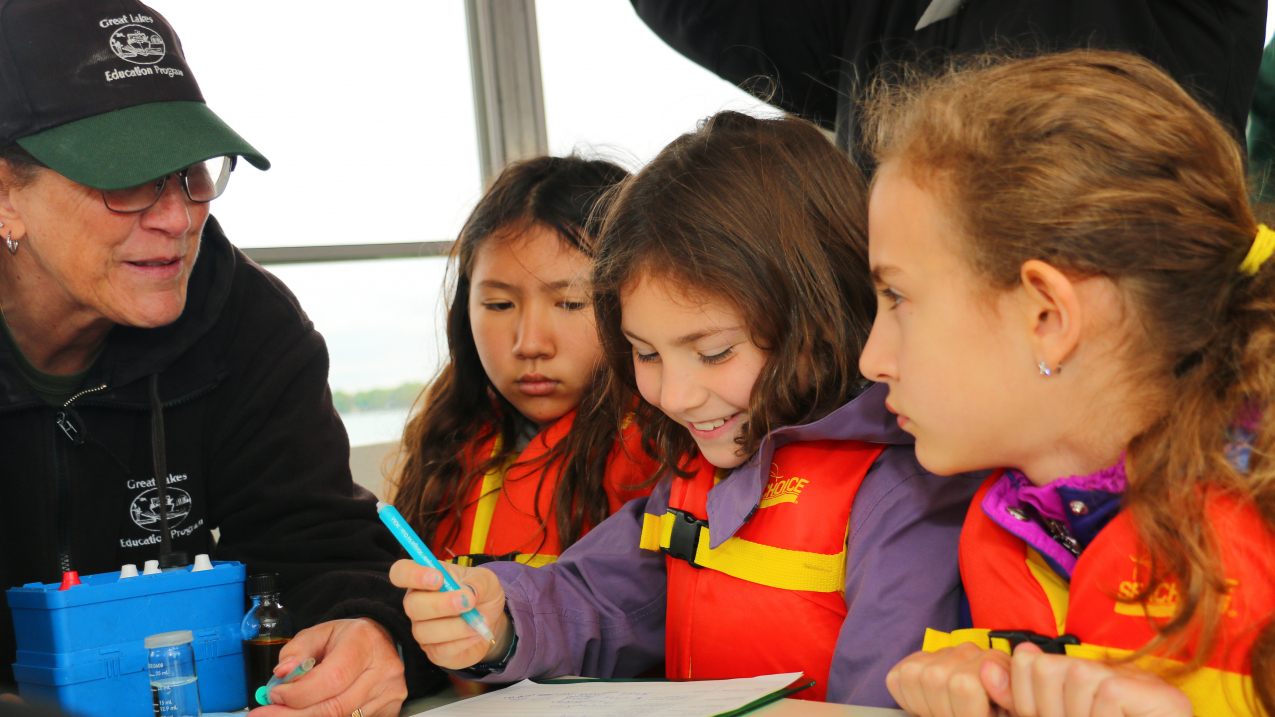
Students from Meridian Elementary School answer question about Lake Erie water quality as part of Great Lakes Education Program on Lake Erie, launching from Lake Erie Metropark on May 19, 2017. (Image credit: Justin Selden)
NOTE: This page is no longer being updated or maintained.
You can find more elementary lessons, activities, units, and much more in our Sea to Sky database. You can bookmark this link, which will take you directly to the Sea to Sky database with elementary ages and lessons, activities, and units pre-selected. You can further refine by subject, topic, or other filters as needed.
A "key" to Alaskan fish ID offsite link
5th - 7th grade • Links to standards
Students examine pictures of ten Alaskan fish species and design a taxonomic (dichotomous) key that can be used to identify them.
Crunching the numbers: How do scientists use data gathered at sea? offsite link
5th - 6th grade • Uses data • Links to standards
Students examine and organize data from a 2012 NOAA sea scallop survey. Students make inferences about what story the data might tell.
Ducks in the flow offsite link
3rd - 5th grade • Teacher guide • Links to standards
Students use scientific inquiry and data gathering skills to learn about force, motion, and ocean currents using the true story of toys that fell off a ship during a storm and drifted to various places.
Exploring changes in ocean chemistry offsite link
4th - 5th grade • Uses data • Links to standards
Students test different water samples, analyze their results, and share their ideas about how to improve the experimental design.
Fish fetch: Fisheries survey activity
K - 8th grade
Students learn how to use sampling to estimate the number of fish in a population.
Groundfish survey offsite link
5th - 6th grade • Links to standards
Students classify fish species, collect and graph data, compare their findings, and learn about variations in habitats.
Mystery of the dead whale: A forensic marine science unit offsite link
3rd - 12th grade • Teacher guide • Links to standards
In this short collection of lessons, the classroom is turned into a NOAA ship to solve the mystery of a dead whale. Students collect tissue samples, analyze data, and test real fish for contamination.
Sanctuaries themed elementary collections
K - 6th grade
In celebration of the 50th anniversary of the National Marine Sanctuary System, the best of the best educational materials for an elementary school audience have been compiled in collaboration with the National Park Trust. Discover Spectacular with these education and outreach digital materials focused on 10 exciting topics: climate change, ocean acidification, marine debris, kelp forest ecosystems, coral reef ecosystems, sea turtles, sharks, whales and ocean noise, seabirds, and shipwrecks.
Shark chalk walk offsite link
3rd - 5th grade • Links to standards
Students research different shark species. They identify sharks by observing their anatomy and looking at the type of prey that the shark eats.
Zooplankton migration patterns offsite link
1st - 12th grade • Teacher guide • Uses data • Links to standards
Students learn how behavioral adaptations of zooplankton (migration patterns) increase their chances of survival.

